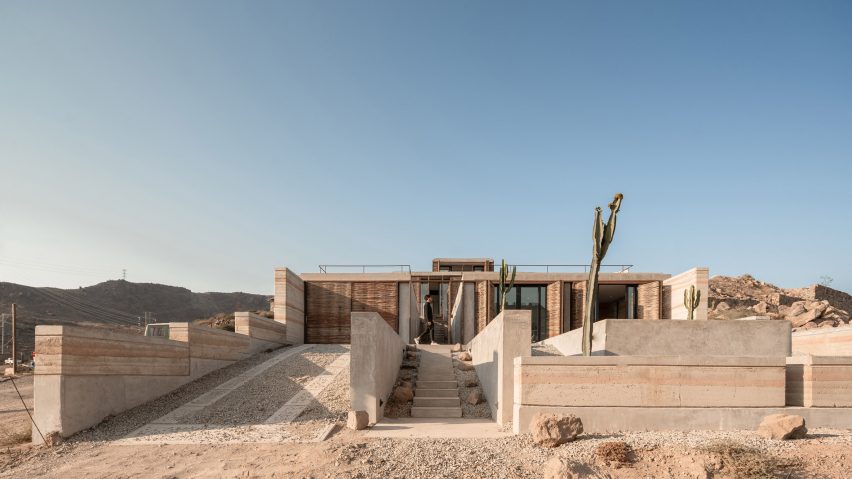Arquitectura Nativa has completed a home in Mexico for a retired archaeologist and their partner, using "rudimentary and artisanal techniques" that help the home blend into its surroundings.
Casa Martha is located on a steep and rocky site facing the ocean in La Misión, a small village situated roughly halfway between the cities of Tijuana and Ensenada, in the Baja California region of Mexico.
Three levels step down a hill, forming the living spaces for a couple and their guests.
Local architect studio Arquitectura Nativa laid out the most public areas of the home on the lowest level. On this floor, there are two guest bedrooms, a dine-in kitchen and a generous outdoor patio facing the street.
Many of the materials used in the home, such as the artisanal wooden shutters and rammed-earth walls, were chosen for their hand-made qualities and appropriateness to the building's context.
"Casa Martha is modelled with deep sensitivity and respect for its surroundings," Arquitectura Nativa principal Alfredo Navarro Tiznado explained.
"The main construction element is compacted earth. In this way, the site and its topography are consolidated as the raw materials of the project," he added.
"The first level is divided into two areas, the visitor area made up of two rooms and the study area that can function as a painting and carpentry workshop or as a garage," Tiznado explained.
A breezeway open to the elements separates the two halves of the home. At the back of the property, two smaller courtyards ensure that every space gets natural ventilation and daylight.
A flight of stairs flanked by rammed-earth walls leads to the intermediate level, which the architect described as the "heart" of the home. This is where the main living space is located.
An open-concept kitchen, living and dining room are flanked by glass walls, which open out towards the landscape and are shaded by an overhanging concrete slab.
A walkway surrounds the home that can be closed off with wooden shutters.
"This lattice generates protection from the prevailing winds, as well as a component of privacy towards the interior," Tiznado explained.
These handcrafted panels also create a "play of light and shadows," Tiznado added.
The studio also laid out two terraces on the roof of the spaces below, offering the occupants a variety of places to enjoy the outdoors.
The topmost level is significantly smaller than the two lower floors and is reserved for the owners.
The second-storey perch offers the best views of the surrounding landscape and is separated from the guest rooms to give all occupants plenty of privacy when using the 310-square-metre home.
"The main chamber has a view of the context's landscape — in this space, the interior is blurred with the exterior," said Tiznado.
Other recent buildings in the Baja California area include a private residence that was converted into a hotel by Paolo Sarra and studio Punto Arquitectónico, and a hotel that combines modern design with traditional influences by Max von Wertz.
The photography is by Oscar Hernández Rodríguez.
Project credits:
Architect: Alfredo Navarro Tiznado
Design team: Kenia Esmeralda García Rosas, Hanna Appel Hernández, Giancarlo Reyes Olguin
Construction: Pedro Luis Curiel Bojórquez, José Francisco Ramírez García, Alfredo Navarro Tiznado,

